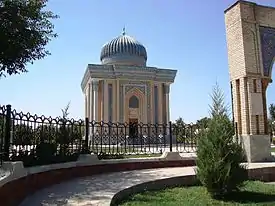Shah Waliullah Dehlawi
Quṭb-ud-Dīn Aḥmad Walīullāh Ibn ʿAbd-ur-Raḥīm Ibn Wajīh-ud-Dīn Ibn Muʿaẓẓam Ibn Manṣūr Al-ʿUmarī Ad-Dehlawī (Arabic: قطب الدين أحمد ولي الله بن عبد الرحيم العمري الدهلوي; 1703–1762), commonly known as Shāh Walīullāh Dehlawī (also Shah Wali Allah), was an Islamic scholar, muhaddith, renewer,[6][7] historiographer, bibliographer, theologian, and philosopher.
Shah Waliullah Dehlawi | |
|---|---|
 | |
| Title | Shadow of wisdom |
| Personal | |
| Born | 21 February 1703 |
| Died | 20 August 1762 (aged 59) |
| Resting place | Munhadiyan[1] |
| Religion | Islam |
| Nationality | Indian |
| Denomination | Sunni |
| Jurisprudence | Hanafi[2][3] |
| Creed | Ash'ari[4] |
| Movement | Renaissance in Indian Muslim Community |
| Main interest(s) | Quran, Hadith, Tafsir, History, Bibliography, Revolution, Fiqh, Military strategy, Sufism |
| Notable work(s) | Translation of the Quran into Persian Language Hujjatullah-il-Baligha Al-Fauzul Kabeer Al-Akidatul Hasanah Majmua Rasail Imam Shah Wali Ullah |
| Tariqa | Naqshbandi[5] |
| Occupation | Mufassir, Muhaddtih, Historiographer, Bibliographer, Theologian, Philosopher, Academic, Linguist, Sufi |
| Part of a series on Islam Sufism |
|---|
|
|
Early life
Shah Waliyullah was born on 21 February 1703 to Tallal Arshad, a prominent Islamic scholar of Delhi. He was known as Shah Walliullah because of his piety. He memorized the Qur'an by the age of seven. Soon thereafter, he mastered Arabic and Persian letters.[8] He was married at fourteen.[8] By sixteen he had completed the standard curriculum of Hanafi law, theology, geometry, arithmetic and logic.[8]
His father, Shah Abdur Rahim was the founder of the Madrasah-i Rahimiyah. He was on the committee appointed by Aurangzeb for compilation of the code of law, Fatawa-e-Alamgiri.[9] His grandfather, Sheikh Wajihuddin, was an important officer in the army of Shah Jahan.
He had a son who was also a famous religious scholar, Shah Abdul Aziz.
Death
He died on Friday the 29th of Muharram 1176 AH/ 20 August 1762 at Zuhr prayer in Old Delhi, aged 59.[10]
Works
- (The Sacred Knowledge), ed. D. Pendlebury, trans. G. Jalbani, The Sacred Knowledge, London: Octagon, 1982.[11]
- Al-Khayr al-kathir (The Abundant Good), trans. G. Jalbani, Lahore: Ashraf, 1974.[11]
- Hujjat Allah al-baligha (The Conclusive Argument of God), Lahore: Shaikh Ghulam Ali and Sons, 1979. Considered his most important work. First published in Rae Bareily, India in 1286 Hijri.[12] This book explains how Islam was found suitable for all races, cultures and people of the world and how successfully it solves social, moral, economic and political problems of human beings.
- Sata'at (Manifestations), trans. into Urdu by S.M. Hashimi, Lahore: Idarah Thaqafat Islamiyya, 1989; trans. into English by G. Jalbani, Sufism and the Islamic Tradition: the Lamahat and Sata'at of Shah Waliullah, London.[11]
- Lamahat (Flashes of Lightning), Hyderabad: Shah Wali Allah Academy, 1963; trans. G. Jalbani, Sufism and the Islamic Tradition: the Lamahat and Sata'at of Shah Waliullah, London, 1980. (One of the important writings on Sufism.)[11]
- Fuyud al-haramayn (Emanations or Spiritual Visions of Mecca and Medina).[11]
- Al-Tafhimat (Instructions or Clear Understanding), Dabhail, 1936, 2 vols. (One of the most comprehensive metaphysical works.)
- Al-Budur al-bazighah (The Full Moons Rising in Splendour).
- Ta’wil al-ahadith fi rumuz qisas al-anbiya (Symbolic Interpretation of the Events in the Mysteries of Prophetic Tales) [13]
Besides these, he is also credited being the first to translate the Quran into Persian in the Indian subcontinent.[7]
Shah Walliullah worked hard to ensure that he was a role model for other Muslims. His deep understanding of the Qur'an, Hadith, Fiqah and Tasawwuf made him highly knowledgeable scholar at an early age.
Since he believed that an emphasis of the Quranic teachings was made vital to Muslims, he translated Arabic Qur'an into Persian. Few Muslims spoke Arabic and so the Qur'an had not been widely studied previously. Some clerics criticised Shah Walliullah, but his work proved very popular. In addition to translating the Quran, Shah Walliullah wrote 51 books in Persian and Arabic. Amongst the most famous were Hujjat Allah al-Baligha and Izalah al Khifa.
His writings bought him great fame and prestige and enabled him to have influence in other areas too. One of his most important contributions to the Muslim community was his organisation of opposition to the Maratha Empire, who had captured large parts of India which were under the control of the Mughal Empire before and had reduced the Mughal emperor to a mere puppet. It was partly his influence which helped to persuade the invader Ahmed Shah Abdali of Afghanistan to intervene. He joined forces with local Muslim leaders which resulted in the defeat the Marathas at The Battle of Panipat in 1761.
He felt a debt to the Sufis for spreading Islam throughout India. He also appreciated Sufi spirituality. Waliullah built a bridge between Sufis and the Ulama (Islamic scholars).[14]
References
- "Shah Waliullah Dehlavi". Encyclopedia of World Biography. Encyclopedia.com.
- Siddiqa, Ayesha. "Peace in Afghanistan." (2019): 703-710. "The first significant name is Shah Waliullah (1703–62), a Hanafi scholar,"
- Shahid, Amir Khan. "DISPLACEMENT OF SHAH WALIULLAH’S Shah MOVEMENT AND ITS IMPACT ON NORTHERN INDIAN MUSLIM REVIVALIST THOUGHTS. Journal of the Research Society of Pakistan 51.2 (2014). "It would not be out of context to cite a reference of Shah Abdul Aziz (1746-1824) which is provided by Manazar Ahsan Gilanithat someone enquired from Shah Waliullah whether the Shias were kafir. He maintained the different viewpoints among the Hanafi School of thought on the subject. The man was not satisfied and urged Shah Waliullah to give his own opinion. While getting the same answer he went away filled with rage..."
- Mohammad Sharif Khan, Mohammad Anwar Saleem (1994). Muslim Philosophy and Philosophers. Ashish Publishing House - APH Publishing. p. 25. ISBN 9788170246237.
- Geaves, Ron. "A Comparison of the Ideas of Maulana Mawdudi (1903-1980) and Shah Wali-Allah (1703-1762): A Pure Islam or Cultural Heritage." Islamic Quarterly 41.3 (1997): 169.
- Kunju, Saifudheen (2012). "Shah Waliullah al-Dehlawi: Thoughts and Contributions": 1. Retrieved 5 April 2015. Cite journal requires
|journal=(help) - Abbas, Mohammad. "Shah Waliullah and Moderation". Islamic Research Foundation International, Inc. Islamic Research Foundation International, Inc. Retrieved 5 April 2015.
- A.C. Brown, Jonathan (2014). Misquoting Muhammad: The Challenge and Choices of Interpreting the Prophet's Legacy. Oneworld Publications. p. 28. ISBN 978-1780744209.
- Anil Chandra Banerjee. "Two Nations: The Philosophy of Muslim Nationalism". Books.google.co.in. p. 44. Retrieved 2016-01-21.
- Al-Khateeb Al-Tabrezi (2013). Mishkaat Al-Masaabih (Manifestations of Truth). Nawab Qutbuddin Khan Dehlavi (trans.), vol. 1, p. 40. Darul-Ishaat.
- "Shah Wali Allah (Qutb al-Din Ahmad al-Rahim) (1703-62)". Muslim Philosophy. Retrieved 5 April 2015.
- "Shah Wali Allah". Center for Islamic Sciences. Center for Islamic Sciences. Retrieved 5 April 2015.
- Virani, Shafique. "Hierohistory in Qāḍī l-Nuʿmān's Foundation of Symbolic Interpretation (Asās al-Taʾwīl): The Birth of Jesus". Studies in Islamic Historiography.
- K.J. Ahmed, Hundred Great Muslims, Library of Islam, 1987.
- K.J. Ahmed, Hundred Great Muslims, Library of Islam, 1987.
External links
| Wikiquote has quotations related to: Shah Waliullah Dehlawi |
